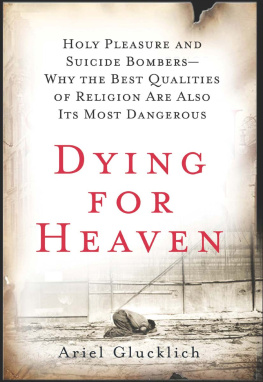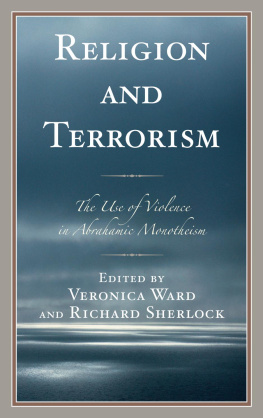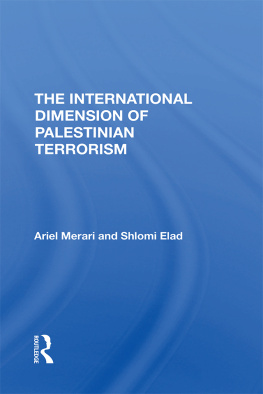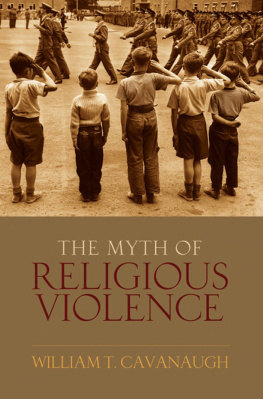Holy Pleasure and Suicide BombersWhy the Best Qualities of Religion Are Also Its Most Dangerous
I MAGINE FINDING YOURSELF IN A game of chicken involving two cars of equal size, both traveling at great speed, where a collision means severe injury or death. Winning will earn you $1,000, which you could use but are not desperate to have. What should you find out about your opponent beforehand? Clearly you would like to know about your opponents experiences with depression or suicidal fantasies, his family situation, and so forth. And of course, you need to ascertain how much your opponent needs the money. Should you also wonder about his religion? For example, does it make any difference what a player believes about the afterlife, or the value his religion places on courage or on money? Should it matter that the driver in the other car hates your religion or that his minister is watching?
You are trying to predict your opponents behavior in an extreme situation, and there is a strong possibility that his religious outlook matters. But how do you gauge its impact on a potential head-on collision?
This, roughly speaking, is the situation that many of us could confront in the near future, but on a far grander scale than two cars charging at each other on a country road. Pakistan and India are both armed with nuclear weapons and sophisticated delivery systems. Iran will undoubtedly join them in the coming decade, and Israel is so armed as well. International embargoes, threats of preventive strikes, and even actual air raids are not likely to change the fact that sooner or later the Middle East or South Asia will approach a nuclear abyss. Experts in nuclear deterrence are already hard at work calculating whether deterrence can reduce the risk, as it did during the cold war, given the political, economic, military, and social conditions that prevail in the countries of these regions. Increasingly, they are also looking at religion.
Given everything we know about religion and about the devastating effects of nuclear and biological weapons, can we safely assume that deterrence will work? Can we measure the impact of faith in God on a nuclear showdown or any other major conflict? Israels recent experiences with both Hizbollah and Hamas raise some serious doubts about the strategy of deterrence. Science can help us predict the rate of glacial melting or the deterioration of bridges on interstate highways. Science and logic can even anticipate the moves of a chess grand master deep into a match, or the response of the Soviet Union to nuclear deterrence. In sharp contrast, religion and one of its chief components, faith in God, are seldom subjected to scientific scrutiny. We avoid scientific evaluation of religion for a variety of reasons, chief among them being the notion that religion is somehow different. How can we explain faith in God by means of psychology or biology if God is not a biological or psychological fact? Similarly, if religion and science are two alternative views of the world, either warring or entirely incompatible, how can one explain the other?
I do not believe we have the luxury of avoiding this scrutiny much longer. The coming nuclear showdown demands that we find scientific and testable answers to a few critical questions about religion and about the world. First, what is it that truly motivates people to be religious? And second, when do religious feelings and choices lead to self-destruction? In any attempt to answer these questions with precision it is vitally important that we take religion seriously and that we avoid oversimplifying what we wish to understand. All too often this is not the case among scientists who try to understand religion.
Why Be Religious?
R ESEARCH DEMONSTRATES THAT WITH the possible exception of a few European countries, the number of people worldwide who identify themselves as religious is on the rise. A few well-publicized recent books have attributed the rise in religious identification to ignorance or stupidity, but clearly this is not a very scientific explanation. Far more nuanced have been the analyses of researchers who study broad religious trends by means of concepts like globalization, migration, and postcolonial identity. But anyone who simply listens to people talking about their faith can arrive at a simpler and more empathetic reason for the rise of religious activity: religion, in the many forms it takes around the world, tends to make people feel happier than its absence. The religious life seems to give people a greater purpose, a sense of belonging to a community, perhaps even a confidence in Gods love for them and the whole world.
So this is the short answer: religion makes us feel good. In fact, when was the last time you heard someone say something along these lines: Faith in God makes me miserable, but duty compels me to believe? There are other occasions for reluctant, perhaps even heroic, duty: volunteering for the army, serving food in a soup kitchen, donating a kidney. Religion is different. And for that matter, when was the last time someone told you she was religious because faith in God helped her understand how the oceans were formed or when the drought will end in Arizona? I suspect that even fundamentalists who look to religion for answers to such questions would drop it in a moment if religion made them miserable. They would deny, of course, that this could ever be the case. So happiness or joy is the gorilla in the room when it comes to religion. In my opinion, religious happiness trumps religious knowledgereligion is not primarily about explaining reality, unless the explanation is itself satisfying. And similarly, people are not religious out of a sense of duty. Religion functions differently from duty: what makes religion compelling is the deep and abiding joy it provides.
But why do so many people feel good about their religion or their faith in God? Is this feeling based on a dispassionate examination of the evidence that led to the conclusion that God does in fact love the world, or that life does have some higher purpose that includes ones own well-being? I suspect that the feeling is so deeply engrained that it is virtually built into our cultural DNA. The positive feeling that attends religionnot the idea of God but the feeling that goes with faith in Godis a product of natural and cultural evolution. Just as maternal love has evolved biologically and culturally, so has the pleasure that religious people derive from their religious feelings. This is why religion has emerged in human history and why it is so persistent in the twenty-first century and for the foreseeable future.
This book will take readers on a long journey, from the biological origins of pleasure to the heights of mystical raptures and to violent self-sacrifice for the glory of God. The stunning tenacity of suicide bombers and the culture that sends them to die will make perfect sense in the light of evolutionary theory. The thread running through the distant stations of this journey is pleasurefirst in its simplest biological or adaptive functions, where it contributes to biological survival, then through increasingly complex and culturally constructed forms. The journey will be marked by surprising insights: it turns out that pleasure is not always what we expect it to be. For example, we normally think of pleasure as sensory, emotional, intellectual, or spiritual. I will show that the evolutionary biology of pleasure would have us divide it instead into novelty, mastery (both achievement and self-control), and exploration. These dimensions are relevant not only to humans but to animals as well. For instance, a mouse will quickly learn to solve a maze-puzzle for a piece of cheese (novelty pleasure), but after two or three successful attempts will become boredthe novelty wears off quicklyand begin to explore outside the maze. The mouses adaptation to novelty leads it to seek a new kind of pleasurable stimulation (exploration) once it has learned the task (mastery). This is why my daughter had to be entertained after three bites when she was fed as an infant. Mastery, for both mice and infants, is exhibited in the capacity to defer the onslaught of boredom and pursue new novelty.









